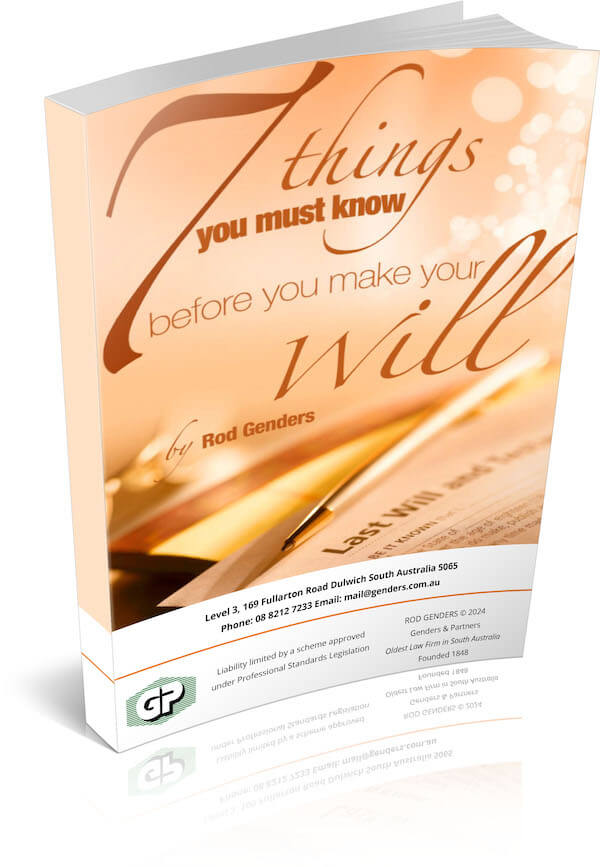In South Australia, the simple form of Probate, known as a Grant of Probate in Common Form requires production and surrender of the Last Will and Testament of the deceased. This means that the original signed document must be located as a matter of priority. Otherwise the executor may not be able to deal with the assets of the deceased.
If the original Will cannot be located, the situation may not be hopeless. A different form of Probate, called a Grant of Probate in Solemn Form, may be attempted with a draft or copy of the last known Will of the deceased.
Where there is good evidence that the deceased made a Will, executed it properly and never intended to revoke it, a Court might choose to grant Probate. The evidence in many cases will be a copy of the executed Will or unsigned final draft of the Will. Even a reconstruction of the contents of the Will based on other evidence, such as a solicitor’s notes, can be used.
A significant amount of additional work and cost is required to prove the lost Will.
Once the copy or draft is obtained, an application is made to the Court with evidence from the subscribing witnesses to the Will as well as other witnesses. The Court will require proof of the due execution of the Will; the existence of the Will after the death of the deceased; rebutting the presumption that the Will has been revoked; and the accuracy of the copy or draft as to the term and contents of the Will.
In the 2014 Queensland case of Lemon v Lemon, the Court admitted a copy of a Will to Probate.
In that case, the executor applied for probate in solemn form of a photocopy of the deceased’s last Will, because despite efforts to find the original Will, no one in the family had seen the original for over 10 years.
The Court heard evidence that, in the last years of his life, the deceased had shown a tendency to throw away large volumes of documents, photographs and sentimental items.
The primary concern in that case was whether the Will had been destroyed in an attempt to revoke it.
The Trial Judge considered the evidence about the deceased’s tendencies to dispose of documents and possessions, and found it probable that he had inadvertently destroyed it. There was no evidence that the deceased had made another Will, or given the original Will to anyone else for safe keeping.
The Judge found that the terms of the copy Will were clear, comprehensive and unsurprising, in light of the deceased’s family circumstances.
When deciding whether or not a copy of a Will can be admitted to Probate, the Court will require evidence to be satisfied about these matters:
- The Will existed, which evidenced the deceased’s testamentary intentions.
- The Will was validly executed.
- The Will revoked all previous Wills.
- The terms of the Will are known.
- The Will has not been intentionally destroyed by the testator in order to revoke it.
Your Will should be kept in a safe place with your other important legal documents. The best way is to lodge it for safe custody with your specialist estate panning law firm Genders & Partners, who can identify the best strategies to help you provide for and protect the financial security of you and your family.
Wills and Estate Planning in Adelaide
You can trust Genders & Partners to help you with every aspect of Adelaide Wills & estate planning. As the oldest law firm in South Australia (established 1848) our firm has over 160 years of experience with probate & deceased estates in Adelaide, and we are committed to working with you to help you plan for the future so that you can feel a sense of peace about the distribution of your estate. Contact our Adelaide law office today to set up your free telephone consultation.
SPECIAL REPORT “7 Things You Must Know Before You Make Your Will”
In this report you will Learn:

Why home-made Wills can be a LOT more expensive than you might think.
The secret weapons used by the rich & powerful to protect their assets, and transfer their wealth two or three generations ahead.
How Estate and Trustee Companies make BIG money from “free” Wills.
The Most Common Estate Planning Mistakes, how they can cost your family a fortune, and How to Avoid Them.
The Elements of a Sound Estate Plan – why a Will alone is not enough.
How to Make Sure Your Assets Stay in Your Family and are not lost to creditors, lawsuits or ex-spouses.
How to guard against challenges to your Estate after you’re gone.








